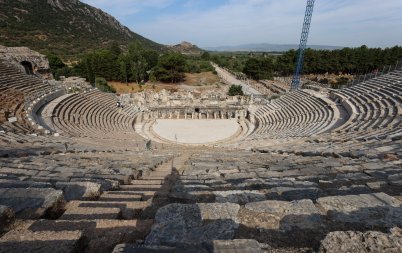The riot inspired by Demetrius spilled over into the entire city. The people gathered at the amphitheater to join in the demonstration.
The Roman theater at Ephesus has been unearthed by archaeologists. Built similar to a modern stadium, it had row upon row of tiered seats built of stone. It could seat about twenty-five thousand people.

Huge amphitheaters like this were built by the Greeks and Roman throughout the ancient world. Others have been discovered at Athens, Corinth, Miletus, Pergamos, and Philippi.
ACTS 19:29 – 29 And the whole city was filled with confusion: and having caught Gaius and Aristarchus, men of Macedonia, Paul’s companions in travel, they rushed with one accord into the theatre.









